Veranstaltungen und Aktivitäten
Wir suchen Verstärkung in Wissenschaft und Verwaltung
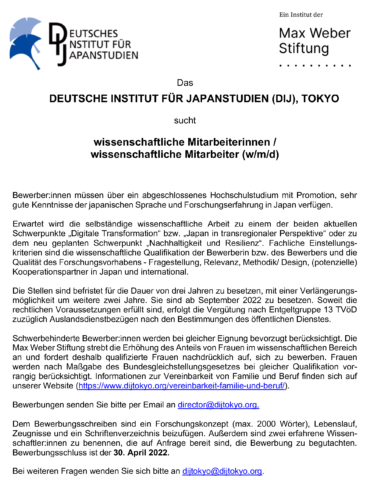 Das DIJ sucht wissenschaftliche Mitarbeiterinnen/Mitarbeiter (w/m/d) mit einem abgeschlossenen Hochschulstudium mit Promotion, sehr guten Kenntnissen der japanischen Sprache und Forschungserfahrung in Japan. Erwartet wird die selbständige wissenschaftliche Arbeit zu einem der beiden aktuellen Schwerpunkte „Digitale Transformation“ bzw. „Japan in transregionaler Perspektive“ oder zu dem neu geplanten Schwerpunkt „Nachhaltigkeit und Resilienz“. Die Stellen sind ab September 2022 zu besetzen, Bewerbungsfrist ist der 30. April 2022. Die Ausschreibung und Details finden Sie hier. Außerdem suchen wir möglichst ab 1. September, spätestens aber zum 1. November 2022, zwei Kolleginnen/Kollegen (w/m/d) in der Verwaltung. Bewerbungsfrist ist der 30. April.
Das DIJ sucht wissenschaftliche Mitarbeiterinnen/Mitarbeiter (w/m/d) mit einem abgeschlossenen Hochschulstudium mit Promotion, sehr guten Kenntnissen der japanischen Sprache und Forschungserfahrung in Japan. Erwartet wird die selbständige wissenschaftliche Arbeit zu einem der beiden aktuellen Schwerpunkte „Digitale Transformation“ bzw. „Japan in transregionaler Perspektive“ oder zu dem neu geplanten Schwerpunkt „Nachhaltigkeit und Resilienz“. Die Stellen sind ab September 2022 zu besetzen, Bewerbungsfrist ist der 30. April 2022. Die Ausschreibung und Details finden Sie hier. Außerdem suchen wir möglichst ab 1. September, spätestens aber zum 1. November 2022, zwei Kolleginnen/Kollegen (w/m/d) in der Verwaltung. Bewerbungsfrist ist der 30. April.
Election campaign film available on DIJ YouTube channel
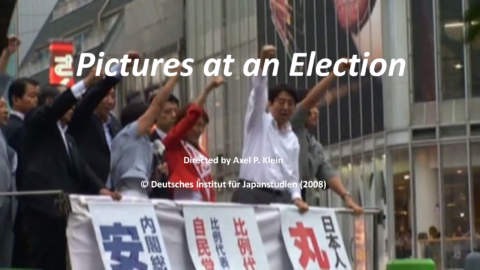 Pictures at an Election is a 68 min. documentary that shows Japan’s electoral machinery in full steam and focuses on the question of how Japanese candidates try to appeal to voters. It depicts different strategies and techniques, and presents a lively picture of political culture in Japan. It was filmed by political scientist and then DIJ senior research fellow Axel Klein (now Duisburg-Essen University, Germany) during the electoral campaigning in July 2007. Until today the documentary has been distributed for free to more than 100 universities all over the world. Since the pandemic has made on campus teaching impossible and online access to teaching material has become indispensable, the DIJ and Axel Klein have decided to publish the documentary on the DIJ’s YouTube channel. Coincidentally, the (unintended) protagonist of the documentary, Marukawa Tamayo, became Minister in charge of Women’s Empowerment and Gender Equality and Minister of State for the Tokyo Olympic and Paralympic Games in February 2021. This documentary shows how she started her political career with her first election campaign. Details
Pictures at an Election is a 68 min. documentary that shows Japan’s electoral machinery in full steam and focuses on the question of how Japanese candidates try to appeal to voters. It depicts different strategies and techniques, and presents a lively picture of political culture in Japan. It was filmed by political scientist and then DIJ senior research fellow Axel Klein (now Duisburg-Essen University, Germany) during the electoral campaigning in July 2007. Until today the documentary has been distributed for free to more than 100 universities all over the world. Since the pandemic has made on campus teaching impossible and online access to teaching material has become indispensable, the DIJ and Axel Klein have decided to publish the documentary on the DIJ’s YouTube channel. Coincidentally, the (unintended) protagonist of the documentary, Marukawa Tamayo, became Minister in charge of Women’s Empowerment and Gender Equality and Minister of State for the Tokyo Olympic and Paralympic Games in February 2021. This documentary shows how she started her political career with her first election campaign. Details
Torsten Weber quoted in Süddeutsche Zeitung article on Japanese history textbooks
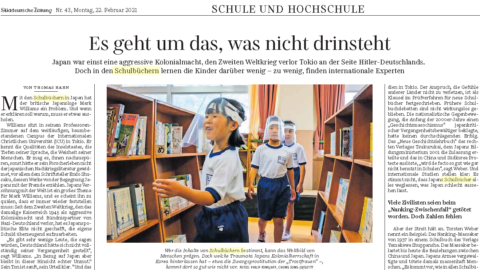
DIJ historian Torsten Weber was interviewed by the German daily Süddeutsche Zeitung for an article on the debate about history textbooks in Japan. Torsten explains that due to the so-called „neighbouring country clause“ the majority of Japanese history textbooks presented a mainstream and relatively well-balanced narrative of Japanese imperialism and war-time aggression. The main objective of the textbooks was to prepare for entry exams. Consequently, they focused on teaching facts, causal relations, and omitted interpretations and controversial statements. Torsten gives the example of the Nanjing atrocities which are explicitly mentioned in the textbooks, including the victimization of Chinese civilians by the Japanese military. However, they avoided giving a number of victims as this remains a contested issue between the governments of Japan and the PR China. The article „Es geht um das, was nicht drinsteht“ (It’s about what’s not in it) appeared in the print version of the SZ on 22 February and can be read online here.
DIJ researchers in Belgian and German media on Tokyo Olympics
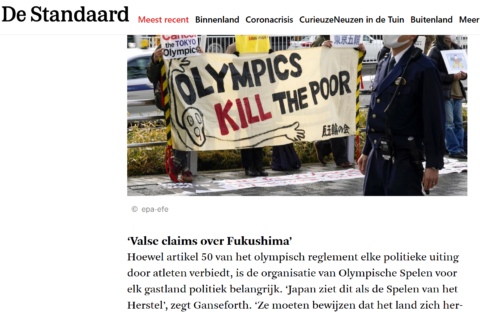
DIJ human geographer Sonja Ganseforth and historian Torsten Weber are quoted in newspaper articles in the Belgian daily De Standaard and the German weekly Die Zeit. Sonja comments on recent criticism in Japan of the Tokyo Olympics. „Activists have been criticizing the exorbitant spending and corruption in the run-up to the Games for years“, she is quoted in the article „Japanners vrezen dat Spelen zullen fungeren als superverspreider“ (Japanese fear that Games may act as superspreader). „The expensive postponement due to the Covid crisis also leads to skepticism“, Sonja says. Torsten’s comments on how the Tokyo Olympics have become linked to promoting nationalism in Japan are quoted in „Olympia 2021 in Japan: Japans Nationalisten und ihr Plan mit den Spielen“ (Japan’s nationalists and their plan with the Games). Their research on the impact of the 2020 Olympics on Japanese society is part of the DIJ’s special project on the Tokyo Olympics and the open access book publication Japan Through the Lens of the Tokyo Olympics.
Online cooperation meeting with University of Vienna
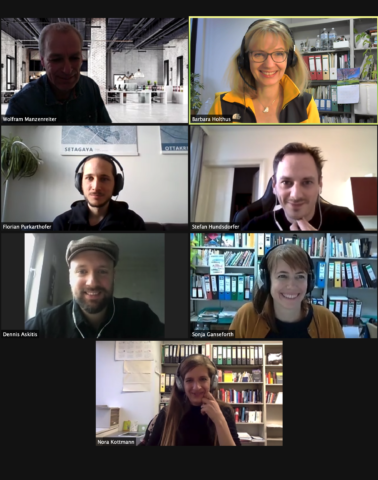
On February 4, seven researchers from the DIJ and its cooperation partner at the University of Vienna met online. Due to the pandemic, Vienna doctoral students are forced to modify their Japan research: travel to Japan has not been possible for over a year, and the doctoral students turn to hiring a Japanese company to conduct survey research on their behalf. DIJ deputy director Barbara Holthus and DIJ researchers Sonja Ganseforth and Nora Kottmann, who have all conducted their own surveys in Japan provided hands-on advice on research companies, costs involved, possible sampling strategies, questionnaire construction and the importance of sharei (incentives). Former DIJ PhD students Florian Purkarthofer and Dennis Askitis as well as Stefan Hundsdorfer, who are all currently doctoral students at Vienna, attended the meeting. It was part of the tight-knit cooperation between the DIJ and Japanese Studies at the University of Vienna. The cooperation started in 2010 with Wolfram Manzenreiter, who also participated in the online meeting, joining the editorial board of Contemporary Japan. Since 2014, one DIJ researcher per year has been teaching a class in Vienna.
Barbara Holthus im DLF Kultur-Interview zu Tokyo 2020
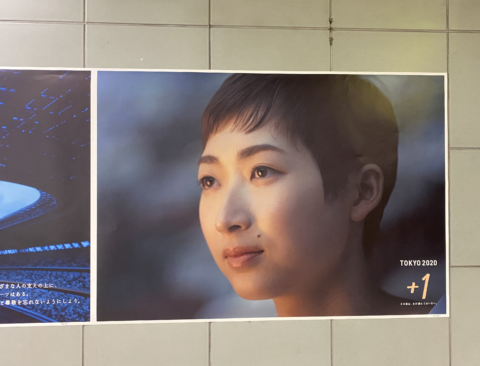
Ein halbes Jahr vor der geplanten Eröffnung der olympischen Spiele hat Soziologin und stellvertretende Direktorin Barbara Holthus im Interview mit DLF Kultur die geschwundene Olympia-Begeisterung in Japan kommentiert. Die Euphorie von 2013, als Tokyo die Spiele zugesprochen wurden, sei Skepsis und Unverständnis über die ausufernden Kosten gewichen. Meinungsumfragen zufolge befürworteten aktuell rund 80% der Bevölkerung eine Absage oder neuerliche Verschiebung. In der andauernden Pandemie bestünde zudem die Gefahr, dass „Olympia zu einem Super-Spreader-Event würde“, so Holthus. Dennoch wolle „Tokyo unbedingt diese Spiele haben, komme was wolle“. Barbara Holthus ist Mitherausgeberin des Olympia-Buches Japan through the lens of the Tokyo Olympics (Routledge 2020, open access), das Japans Gesellschaft, Politik und Wirtschaft anhand der Vorbereitungen auf Tokyo 2020 untersucht. Das DLF-Interview kann hier nachgehört werden.
Franz Waldenberger in der ZEIT zur Wirtschaftspolitik in Japan
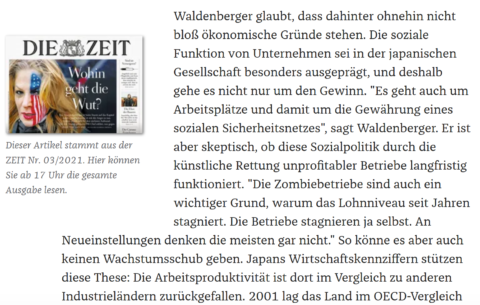
DIJ-Direktor und Ökonom Franz Waldenberger hat sich in der aktuellen Ausgabe der ZEIT (3/21) zur Strategie der japanischen Regierung geäußert, durch staatlich garantierte Kredite sogenannte „Zombieunternehmen“ künstlich am Leben zu halten. „Die Nullzinspolitik sorgt dafür, dass der Ausleseprozess zwischen produktiven und unproduktiven Unternehmen schwächer wird.“ Gleichzeitig erklärte er, dass diese Subventionen unprofitabler Betriebe in Japan eine soziale Funktion erfüllten. „Es geht auch um Arbeitsplätze und damit um die Gewährung eines sozialen Sicherheitsnetzes“, betonte Waldenberger. Der Artikel „Land der Zombies“ ist hier auch in der Online-Ausgabe zu lesen.
Season’s Greetings and best wishes for the New Year

Das Deutsche Institut für Japanstudien wünscht erholsame und frohe Festtage und einen guten Start in ein erfolgreiches Jahr des Büffels!
The German Institute for Japanese Studies wishes you a happy holiday season and a successful Year of the Ox!
ドイツ日本研究所一同、皆様のご多幸と来るべき新年が成功の年になることを祈念いたします。

















 Open Access
Open Access 
